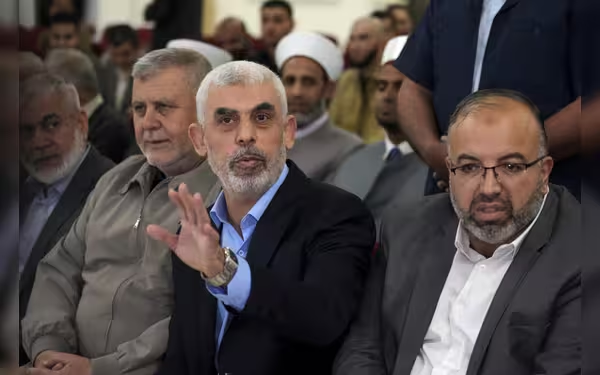Tuesday, October 29, 2024 05:32 AM
Yahya Sinwar Killed in Israeli Operation in Gaza
- Hamas leader Yahya Sinwar killed in Gaza operation.
- Israeli forces tracked Sinwar using a mini drone.
- Sinwar's death raises questions about Hamas strategies.
 Image Credits: arabnewspk
Image Credits: arabnewspkYahya Sinwar, a key Hamas leader, was killed in an Israeli operation in Gaza, raising concerns about the ongoing conflict and Hamas strategies.
In a significant development in the ongoing conflict between Israel and Hamas, Yahya Sinwar, a prominent leader of Hamas, was killed during an operation in southern Gaza. This event marks a pivotal moment in the long-standing struggle between the two sides, particularly following the recent escalation of violence that began with the October 7, 2023, attacks on Israel. Sinwar was known as a key architect of these attacks, which have had devastating consequences for both Israelis and Palestinians.
According to reports, Israeli forces tracked Sinwar using a mini drone, capturing footage of him in a vulnerable state as he lay injured in the ruins of a building. The video, released by Israeli authorities, shows him attempting to fend off the drone by throwing a stick, highlighting the desperation of his situation. This operation was not a meticulously planned strike but rather an encounter that unfolded during a search for suspected militants in the Tal El Sultan area of Gaza.
Israeli military officials stated that after a year-long manhunt, Sinwar was identified only after he was found with a weapon and a flak jacket. The operation that led to his death involved infantry soldiers from the Bislach Brigade, who engaged in a gunfight with suspected militants. Despite the chaos, Sinwar's identity was confirmed through dental records, fingerprints, and DNA testing.
In the months leading up to his death, Sinwar had reportedly ceased using communication devices, likely in an attempt to evade Israeli intelligence. This change in behavior reflects the intense pressure he faced from Israeli forces, which had been actively working to limit his operational capabilities. The Israeli military noted that their extensive operations in the region had significantly restricted Sinwar's movements, ultimately leading to his demise.
Interestingly, while Sinwar was known for his ruthless tactics, there were no hostages found in the vicinity when he was captured. This raises questions about the strategies employed by Hamas to protect its leaders and the implications for the hostages still held in Gaza. The Israeli military has expressed concerns that Sinwar may have used hostages as human shields, a tactic that complicates the already fraught situation.
As the dust settles on this operation, it is essential to consider the broader implications of Sinwar's death. While it may be seen as a tactical victory for Israel, the ongoing conflict continues to pose significant challenges for both sides. The cycle of violence shows no signs of abating, and the humanitarian situation in Gaza remains dire. The loss of a key figure like Sinwar may alter the dynamics of Hamas, but it does not resolve the underlying issues that fuel this protracted conflict.
The killing of Yahya Sinwar serves as a stark reminder of the complexities and tragedies of the Israeli-Palestinian conflict. As both sides grapple with the aftermath, it is crucial for the international community to engage in meaningful dialogue aimed at achieving lasting peace. Only through understanding and cooperation can the cycle of violence be broken, paving the way for a more hopeful future for all those affected by this enduring struggle.













